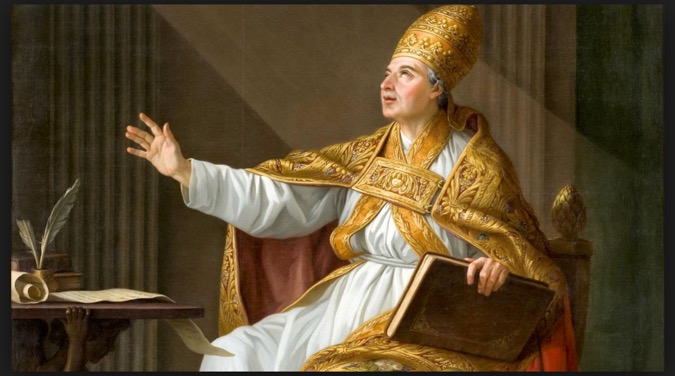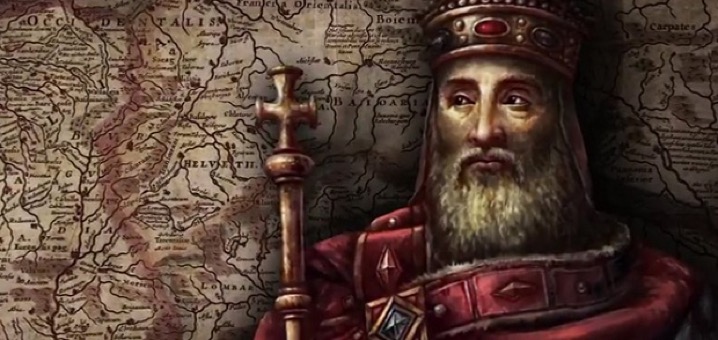Origin of the Temporal Power of the Church
and the Rebirth of the Empire
(8th to 10th century)

The growing authority of the Church
Following the dissolution of the Roman Empire under the pressure of Germanic migrations, the Church in Italy found itself exercising not only spiritual functions in the forms of giving comfort and protection of the weak, but also a real political role. Thanks to its solid hierarchical organization, the clergy had acquired a central role in the preservation of the administrative, social and cultural role of the imperial team. This happened because it was almost only among the men of the Church that educated people could be found who were able to perform the functions that once had been the competence of the State. Moreover, the Church Authority had grasped the opportunity to strengthen itself in turbulent times during the establishment of the Roman-Germanic kingdoms and feudal anarchy. In the power vacuum caused by the weakening of the Eastern empire and the disorder and violence that followed, the bishops became a solid reference point for the population, even on the administrative and political levels. In the Church of Rome, the West could find its cultural and moral unity.
The expansion of Christianity under Gregory the Great
Under the leadership of some great pontiffs, Christianity had spread among the people of Germanic origin, once pagan or Aryan. Among these, Gregory the Great, who was Pope from 590 to 604, must certainly be mentioned. The Church, at that time, already possessed a great economic power and a substantial territorial heritage, thanks to the donations made by the faithful. Gregory the Great, however, transformed the way Church had been until then into a strong moral, administrative and disciplinary organisation, with the aim of strengthening its prestige and increasing its authority. Gregory, therefore, may well be considered the founder of the temporal power of the Church. The consolidation of this power was favored by the Lombards themselves who, after having converted to the Christianity of Rome and adopted the Latin culture, worked to restore the political and territorial unity that they had in antiquity.
Spiritual power vs. Temporal power
The Church, as a religious organism, carries out its role as guide of the Christian community in matters of faith, that is, in matters related to the salvation of the soul. As such, anything inherent to its spiritual power focuses mainly on the relationship of man with God, the interpretation of the Scriptures and the moral principles that they must animate the conduct of the faithful. This is its spiritual role. Earthly matters, of political administration, territorial government, juridical legislation belong, instead, to the temporal sphere, that is, earthly and political. Normally these are the specific tasks of the government of a State.
In the Middle Ages, the Church expected to incarnate this second power; temporal and ephemeral because related to matters that were time bound and, therefore, subject to end, as opposed to the spiritual, which is concerned with the eternal. The Church expected to assume the specific responsibilities of the conduction of the State - from the right to exercise sovereignty over land and men to the military defence of the territory; from the issuance of civil laws to the administration of ordinary justice.
The Rebirth of an Empire
The growing authority of the Church caused a series of contrasts with the Byzantine Empire. The Byzantines did not allow the independence of religious power from the political one and saw in the Roman pontiff only a patriarch subjected to the power of the Emperor. The Papacy wanted to increase its autonomy from the Eastern empire and defend itself against the Longobard expansionism. It was, in fact, in the Pontiff’s interest to bring together the north and the south of the Italian peninsula, also incorporating the so-called "heritage of St. Peter". For this very reason, the Roman pontiff sought political support in the West and found it in the kingdom of the Franks of Pépin le Bref. This alliance continued and was consolidated with the successor of Pépin, Charlemagne, who was crowned Holy Roman Emperor in the Christmas of 800 by the hand of Pope Leo III. Thus the empire was reborn in the West, the Holy Roman Empire, which appeared superior to the former because it had been consacrated by the Pope. This led to the definitive separation between Rome and Byzantium.
The Holy Roman Empire
The Holy Roman Empire was the first form of aggregation of the Western peoples after 476. Charlemagne found himself at the head of a huge territory. To the north there was the Baltic Sea and to the south the Mediterranean; the Atlantic Ocean to the west and the river Ems in Germany to the east. There were, approximately, fifteen million inhabitants with different traditions and cultures. Charlemagne tried to control this organism through a unified government based on new political institutions. Unlike previous German kings, who did not have a permanent establishment, Charlemagne established his residence in Aachen, Germany. In order to enact laws, he would convene the notables twice a year.
Every year in the spring, Charlemagne gathered around him his counts, marquises, bishops and abbots in large assemblies called "May camps" (Campi di Maggio). After discussing the main problems of the kingdom, in the end the emperor would issue one or more laws that could regulate the difficult government of such a vast territory with so many cultural, linguistic and juridical differences. The laws dictated by the emperor were gathered in the capitulars (from the Latin capitularia, texts divided into capitula [chapters]or paragraphs). Through the capitulars Charlemagne regulated all the sectors of his empire either through the implementation of laws that were completely new or with norms that integrated the laws already in use with the free people.
The Emperor took care of the intellectual and spiritual education of the ruling classes. For this reason, he founded the Palatine School. He also instituted numerous schools and libraries and fostered the circulation of books and the reproduction of manuscripts, copied by the scribal monks, the impetus to trade, industry and the arts, thus initiating that cultural flourishing which is known as the "Carolingian renaissance".
Fiefs and Counties
Charlemagne divided the territory, considering it his personal and hereditary heritage, in counties (inland regions) and fiefs (border regions), which he entrusted to counts and marquises. The system was based on the principle of loyalty: counts and marquises owed their sovereign help and obedience both in times of war and in times of peace, becoming the Emperor’s vassals. In return, the sovereign assured them the temporary enjoyment of the benefits, generally a plot of land, to be returned upon the death of the vassal or in the event of treason. The Emperor's intent was to create a vast network of personal connections between himself and his collaborators. He also sought to avoid any possible abuse of power by his vassals through the sending of supervisors (missi dominici) purposely employed to supervise their work. What once had been a strong point in favour of the Carolingian kings, that is the distribution of land to their loyal collaborators, became their weak point when the conquests ended and they could no longer assign the occupied lands to the vassals. Vassals slowly succeeded in becoming independent from the authority of the sovereign and the area of the empire ended up divided into numerous local lordships.
The birth of Feudal Kingdoms
At the death of Charlemagne (814), after a period of struggle for succession, peace arrived with the signing of the Treaty of Verdun in August 843. This was the first of the treaties that divided the Carolingian Empire into three kingdoms among the three surviving sons of Louis the Pious, son of Charlemagne. This treaty ended a three year Carolingian civil war.
Lothair got Italy and the Lotaringia territory, Louis the German and Charles the Bald got East France and West France respectively. In 885 the empire was very briefly reunited by Charles III until 887, after which there was the definitive dismemberment of the empire and the first feudal kingdoms formed, many small independent islands and all disputing and fighting each other.

© 2018 – ASTOLAT PRODUCTIONS
INTELLECTUAL PROPERTY: JMCAMILLERI